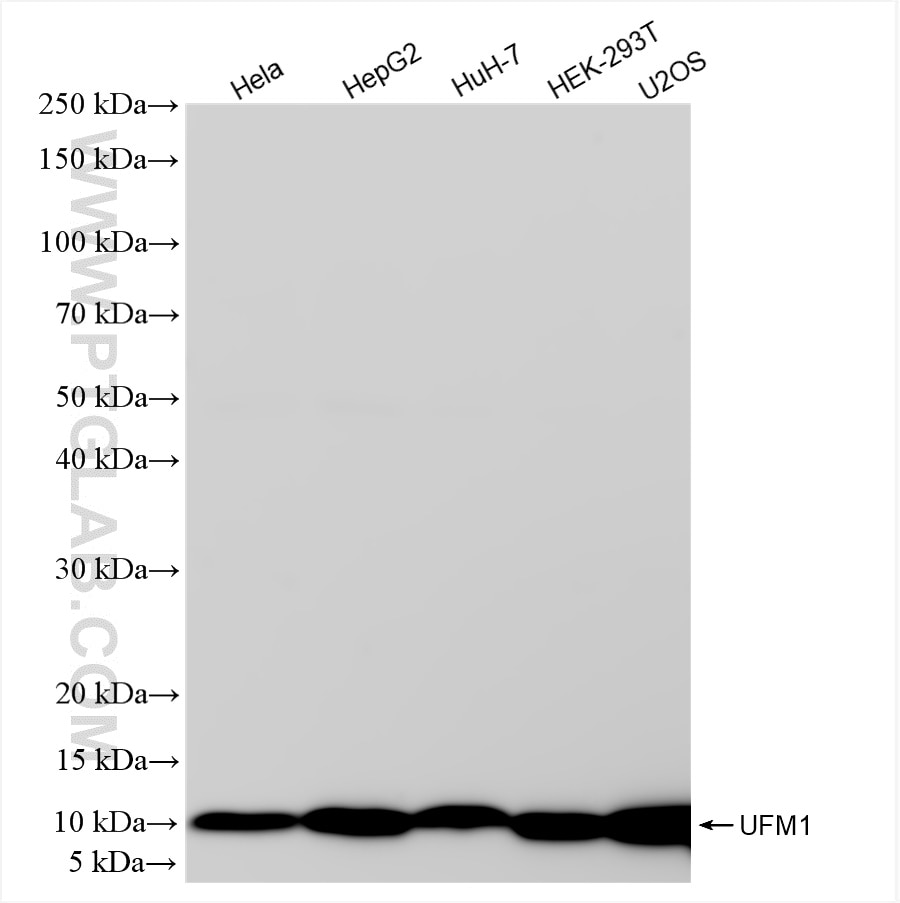Tested Applications
| Positive WB detected in | HeLa cells, HepG2 cells, HuH-7 cells, HEK-293T cells, U2OS cells |
Recommended dilution
| Application | Dilution |
|---|---|
| Western Blot (WB) | WB : 1:5000-1:50000 |
| It is recommended that this reagent should be titrated in each testing system to obtain optimal results. | |
| Sample-dependent, Check data in validation data gallery. | |
Product Information
85068-5-RR targets UFM1 in WB, ELISA applications and shows reactivity with human samples.
| Tested Reactivity | human |
| Host / Isotype | Rabbit / IgG |
| Class | Recombinant |
| Type | Antibody |
| Immunogen |
CatNo: Ag8667 Product name: Recombinant human UFM1 protein Source: e coli.-derived, PGEX-4T Tag: GST Domain: 1-85 aa of BC005193 Sequence: MSKVSFKITLTSDPRLPYKVLSVPESTPFTAVLKFAAEEFKVPAATSAIITNDGIGINPAQTAGNVFLKHGSELRIIPRDRVGSC Predict reactive species |
| Full Name | ubiquitin-fold modifier 1 |
| Calculated Molecular Weight | 85 aa, 9 kDa |
| Observed Molecular Weight | 9-12 kDa |
| GenBank Accession Number | BC005193 |
| Gene Symbol | UFM1 |
| Gene ID (NCBI) | 51569 |
| Conjugate | Unconjugated |
| Form | Liquid |
| Purification Method | Protein A purification |
| UNIPROT ID | P61960 |
| Storage Buffer | PBS with 0.02% sodium azide and 50% glycerol, pH 7.3. |
| Storage Conditions | Store at -20°C. Stable for one year after shipment. Aliquoting is unnecessary for -20oC storage. 20ul sizes contain 0.1% BSA. |
Background Information
UFM1 (Ubiquitin-fold modifier 1) is a ubiquitin-like protein covalently conjugated with intracellular proteins through UFMylation (modification by UFM1), a process similar to ubiquitylation (PMID: 38141606). UFM1 is conjugated to its target proteins by E1-like activating enzyme UBE1DC1 and E2-like conjugating enzyme UFC1 in a manner analogous to ubiquitylation (PMID: 28234446; 33066455). At the molecular level, UFMylation is an important mediator of the protein function. Dysregulation of the UFM1 system, e.g., the knockout of UFMylation components, disturbs proteome homeostasis and triggers endoplasmic reticulum stress. Such changes are linked to developmental disorders, tumorigenesis, tissue injury, inflammation, and several hereditary neurological syndromes (PMID: 36932998).
Protocols
| Product Specific Protocols | |
|---|---|
| WB protocol for UFM1 antibody 85068-5-RR | Download protocol |
| Standard Protocols | |
|---|---|
| Click here to view our Standard Protocols |




